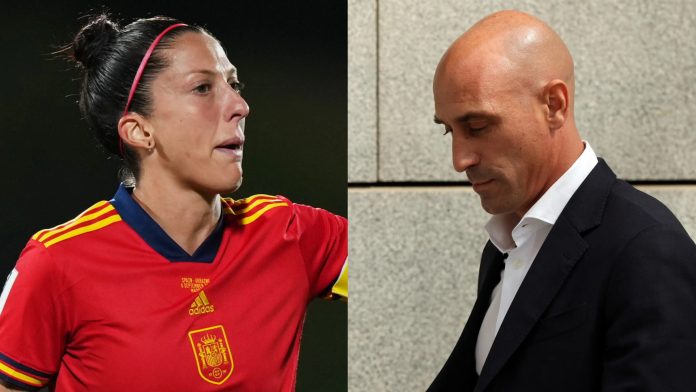Former president of the Spanish Football Federation (RFEF), Luis Rubiales, has been handed a three-year ban from all football-related activities by the Fifa disciplinary committee. The suspension comes after an investigation into Rubiales’ conduct during the Women’s World Cup final, where he planted a kiss on the lips of Spain forward Jenni Hermoso during the medal ceremony – an act she has described as non-consensual, a claim he denies.
The controversy began when Rubiales received a 90-day suspension just six days after the Women’s World Cup final, during which Spain secured a historic victory. Rubiales was seen celebrating exuberantly, grabbing his crotch in celebration, and even carrying Athenea del Castillo over his shoulder. Amidst the uproar, he initially refused to resign from his position as RFEF president, claiming to be the victim of a witch-hunt.
However, on September 10, following the departure of Spain manager Jorge Vilda, a staunch ally of Rubiales, he finally tendered his resignation. Rubiales’ exit marked a turning point in a saga that had gripped the footballing world.
2023 Premier League’s Defensive Revelation: Why Romero Could be the Best Center Back for the Season
Fifa’s disciplinary committee found Rubiales in breach of Article 13 of the Fifa Disciplinary Code, relating to “offensive behavior and violations of the principles of fair play.” The committee’s decision led to the three-year ban, which was announced on Monday. Rubiales now has the option to request a motivated decision within the next 10 days, which, if sought, would be subsequently published on Fifa’s official website. The decision also remains subject to a potential appeal before the Fifa appeal committee.
The case has garnered significant attention, with the high court in Spain examining it further. Prosecutors have cited concerns about potential charges of sexual assault and coercion in relation to the kiss between Rubiales and Jenni Hermoso.

For over a decade, concerns surrounding the culture and conditions of the Spanish women’s national team have gone unaddressed, with players facing retaliation for speaking out. In 2011, players raised issues about the federation’s indifference towards women’s football, and after a disappointing 2015 World Cup, they called for managerial changes and improved facilities. While changes were made, senior players who had been part of the movement were gradually phased out.
Tensions escalated further after the 2022 Euros, where 15 players cited the negative impact of the environment around the national team on their health and well-being. Rubiales and the federation supported manager Jorge Vilda, and the dissenting players were only called up if they apologized. However, three of them returned to the squad for the Women’s World Cup, with Spain ultimately winning the tournament in Australia and New Zealand.
Despite the triumph, the controversy surrounding Rubiales’ actions has cast a shadow over the historic achievement. Jenni Hermoso, who initially found herself sidelined, made a triumphant return to the team, scoring the winning goal against Italy in a recent Nations League match.
The ban on Luis Rubiales serves as a reminder of the importance of fair play and respectful conduct in football, and it marks a significant moment in the ongoing efforts to address concerns within the women’s game.
Pictures Courtesy


